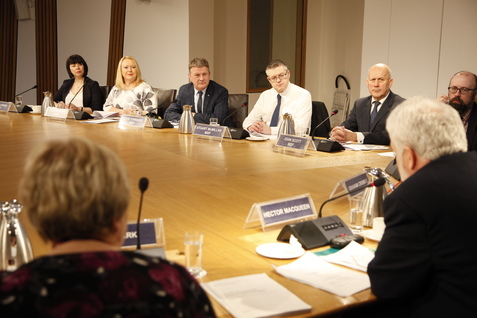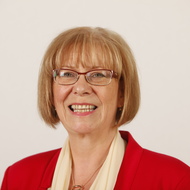Delegated Powers and Law Reform Committee
Annual Report 2016-17
Introduction
This report covers the work of the Delegated Powers and Law Reform Committee during the Parliamentary year from 12 May 2016 to 11 May 2017. The Committee has scrutinised a number of Scottish statutory instruments this year, as well as delegated powers provisions within several bills.
The Committee also began consideration of the third Scottish Law Commission (SLC) bill to be introduced since the remit of its predecessor committee was changed to allow for the consideration of such bills in June 2013.
Membership changes
Previous Members of the Committee during the reporting year:
Rachael Hamilton (from 7 June 2016 until 17 November 2016)
Elaine Smith (from 7 June 2016 until 8 September 2016)
Image © Scottish Parliamentary Corporate Body - 2017. Licensed under the Scottish Parliament Copyright Licence.Image © Scottish Parliamentary Corporate Body - 2017. Licensed under the Scottish Parliament Copyright Licence.
Bills
In addition to SLC bills, the Committee considers delegated powers provisions in Scottish Government, Members’, Committee and Private bills, reporting to subject committees and the Parliament on issues such as the scope of delegated powers and whether delegated powers are within vires.
Over the reporting period, the Committee has considered and reported on the following seven bills at Stage 1:
Limitation (Childhood Abuse) (Scotland) Bill;
Budget (Scotland) Bill;
Railway Policing (Scotland) Bill;
Air Departure Tax (Scotland) Bill;
Seat Belts on School Transport (Scotland) Bill;
Child Poverty (Scotland) Bill;
Domestic Abuse (Scotland) Bill.
The majority of the bills considered by the Committee during the reporting period were Scottish Government bills and, as with previous years, it is hoped that the recommendations of the Committee on those bills will lead to a number of changes by the Scottish Government to relevant provisions. Through its scrutiny process, the Committee also aims to ensure that the correct balance between primary and secondary legislation is maintained.
The Committee considered and reported on three Legislative Consent Memorandums (LCMs). These are related to UK Parliament bills which seek to change the law or alter Scottish Ministers’ or the Scottish Parliament’s powers in relation to devolved matters. The three LCMs considered by the Committee were in connection with the:
Policing and Crime Bill (UK Parliament legislation);
Criminal Finances Bill (UK Parliament legislation);
Digital Economy Bill (UK Parliament legislation).
The Committee also considered and reported on a supplementary LCM relating to the Criminal Finances Bill.
Subordinate Legislation
The Committee has considered a significant number of instruments this year, working to tight timescales to produce 30 reports over the reporting year on statutory instruments alone. During the parliamentary year, the Committee reported on 281 Scottish statutory instruments in total.
Of the instruments considered, 60 were subject to affirmative procedure, 128 to negative procedure, and 91 were not subject to any parliamentary procedure.
In addition to the instruments outlined above, the Committee also considered one provisional-affirmative instrument and one super-affirmative instrument.
The Committee published three quarterly reports which recorded the Committee’s scrutiny of instruments during the first three quarters of this parliamentary year.
Equalities
The Committee considers equalities issues which can arise under the European Convention on Human Rights and under Community law. It is part of the Committee’s remit to draw the attention of lead committees and the Parliament to any instrument, or bill that, in its opinion, fails to comply with any such requirement.
The Committee also scrutinises drafting practice and so points out, for example, failure to use gender neutral language in instruments. This the Committee did when reporting the First-tier Tribunal for Scotland Housing and Property Chamber (Procedure) Regulations 2016 (SSI 2016 339) under the general reporting ground on account of the instrument failing to follow normal drafting practice, with several provisions not drafted in gender neutral terms in the form of references to “he”, “his” or “him”.
Following publication of the Committee’s report, the Scottish Government gave a commitment to bring forward an amending instrument that would be drafted in gender neutral terms.
Meetings
The Committee met 30 times during the parliamentary year. Of these meetings, none were entirely in private and 16 included items in private.
The main reasons for taking business in private were to consider draft reports or to consider oral evidence heard earlier in the meeting.
On 30 August 2016, the Committee held a Business Planning Day with discussion focusing on the core work of the Committee, working practices and priorities and external perspectives on the role the Committee has in scrutinising both primary and secondary legislation.
All the Committee’s meetings have been held in Edinburgh.
 Image © Scottish Parliamentary Corporate Body - 2017. Licensed under the Scottish Parliament Copyright Licence.
Image © Scottish Parliamentary Corporate Body - 2017. Licensed under the Scottish Parliament Copyright Licence.

